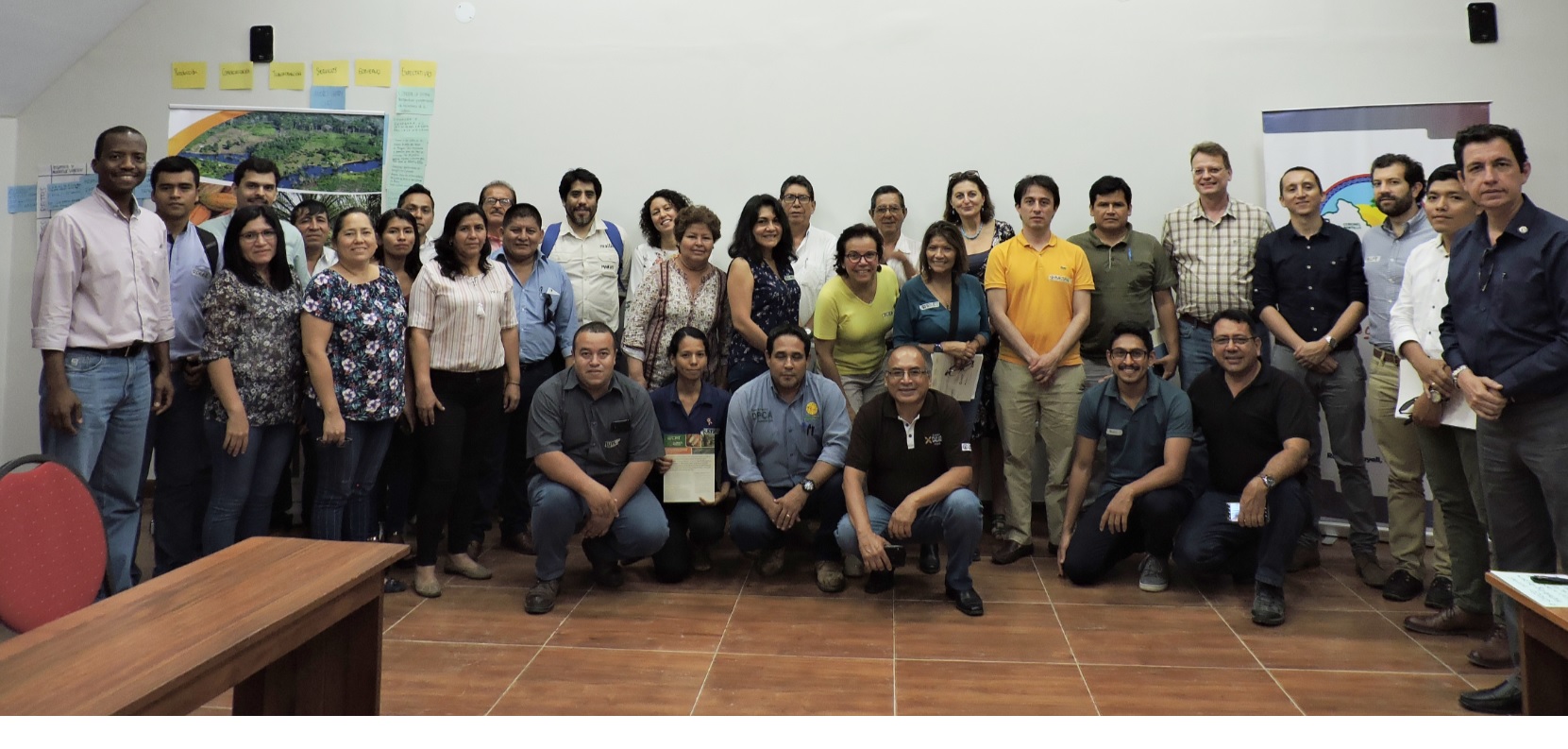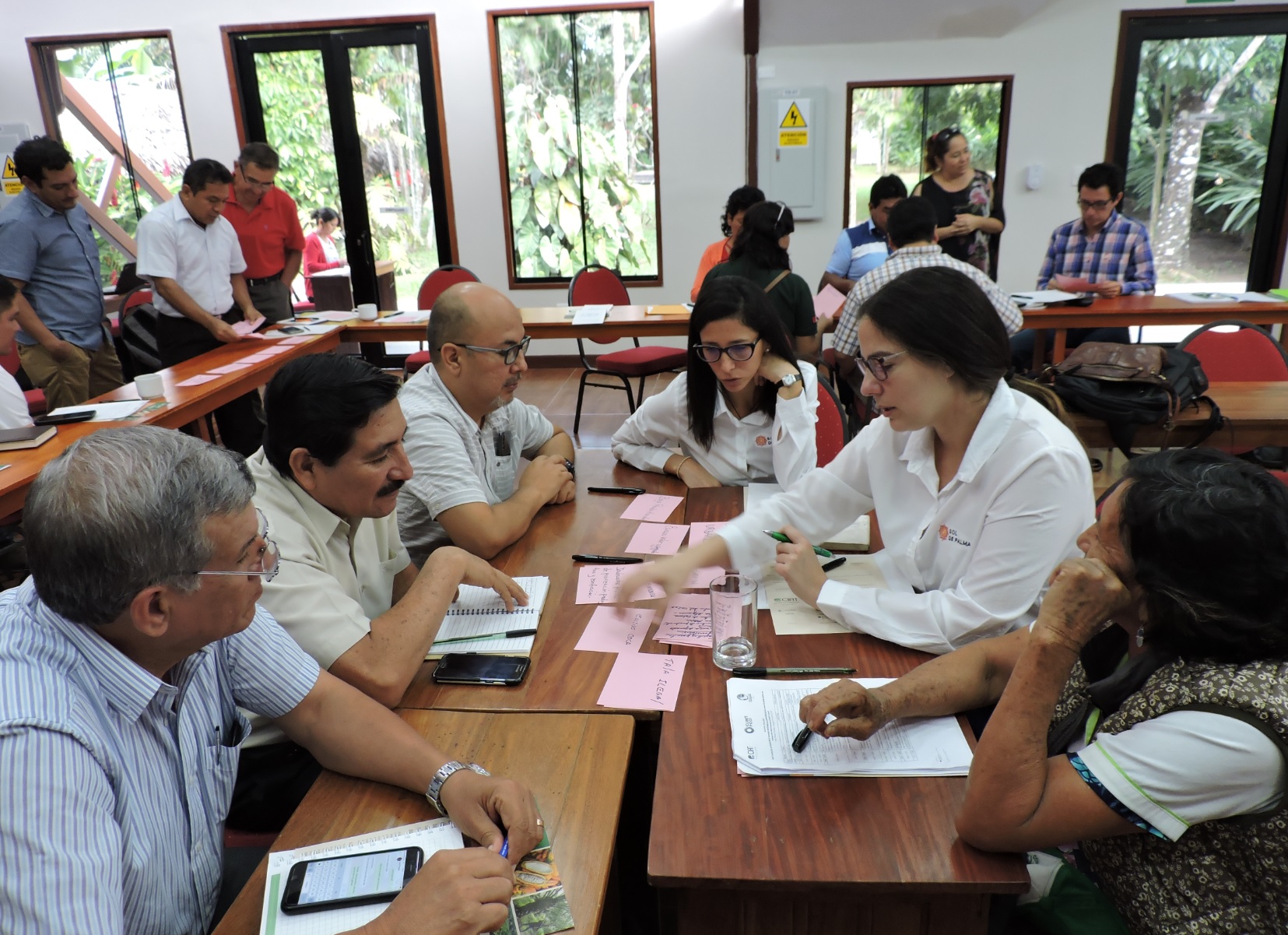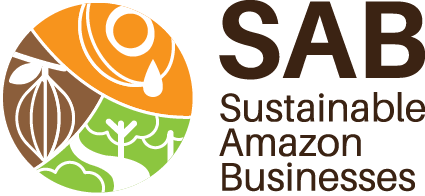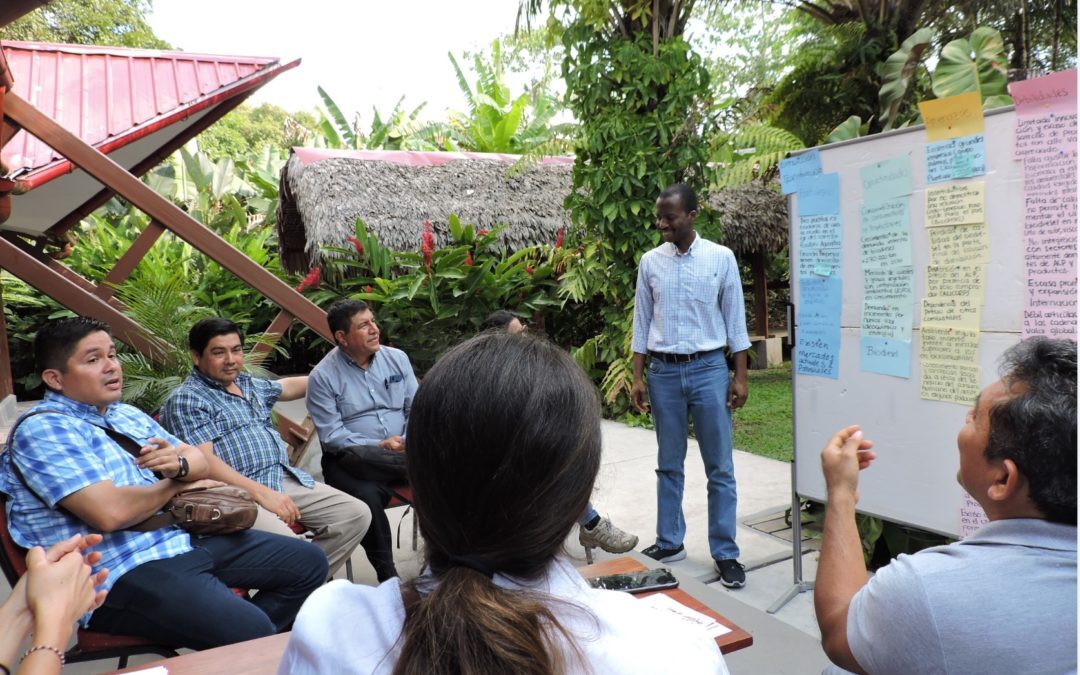Within the framework of the “Business Models to Address Drivers of Deforestation in Peru” project (called Sustainable Amazon Businesses – SAB – for short), which is being implemented by CIAT in partnership with the international advisory company Climate Focus, and in coordination with the Ucayali Regional Government, two workshops were held in the city of Pucallpa for the participatory development of a sectoral competitiveness strategy for the cocoa and oil palm value chains with a zero-deforestation approach. Along with these workshops, the multistakeholder platforms for both regional value chains were launched, and they will be promoted by the project.
COCOA WORKSHOP, 4–5 July
Last 4 July, Ángel Gutiérrez Rodríguez, Vice-governor of Ucayali, opened the workshop for the cocoa value chain along with Yovita Ivanova, Project Coordinator. Different local and national entities related to stages of the value chain took part in the two-day event. The participants included cocoa producer cooperatives, public and private agencies providing financial and training services, government institutions, such as the Ministry for the Environment (MINAM), the Ministry of Agriculture and Irrigation (MINAGRI), and the Forest and Wildlife Service (SERFOR), as well as international cooperation agencies and academia.

During the first day, CIAT researchers made presentations on the current situation of the cocoa value chain in the Ucayali region. Additionally, there were presentations by representatives of Agrobanco, SERFOR, the Ecocert Perú certifier, and the Colpa de Loros cooperative. During the afternoon session, an expert panel was convened to discuss on the challenges and opportunities to develop a cocoa value chain with an environmental and zero-deforestation approach in the Ucayali region. The panel was integrated by Pierre Neyra, Business Manager at Ecocert; María Alván, Project Coordinator of the Supply Chains Project of the Ucayali Regional Government; Belmira Carrera, SERFOR Specialist; Ernesto Parra y García, Manager of the Colpa de Loros Cooperative; and Patricia Patrón, Specialist of the General Directorate for Climate Change and Desertification at MINAM.
During the second day of the workshop, the Climate Focus team, along with the Althelia Global Private Investment Fund, presented financing alternatives for cocoa producers. In addition, participants contributed to the development of a shared vision of the value chain, with an environmental and zero-deforestation approach. To do so, group dynamics were facilitated by the CIAT team.
PALM OIL WORKSHOP, 8–9 July
The workshop to address the oil palm value chain in the Ucayali region was held on 8–9 July. Oil palm producer associations, extraction companies, government institutions, such as MINAGRI, INIA, and SERFOR, research centers, international cooperation agencies, and a private funder attended the event. The first day, the status of the oil palm value chain in the region was reviewed through presentations by CIAT researchers and specialists from the Ucayali Regional Government and MINAGRI. Additionally, Sol de Palma, a consortium of companies from the palm oil industry, made a presentation about the sustainability commitments they have across the value chain. On the other hand, the NGO Solidarity presented the plans and projects it has been implementing in the oil palm value chain in Peru, seeking to improve its competitiveness and sustainability through 2021. Finally, the Agroforestry Research Center (ICRAF) presented its experience implementing agroforestry systems with oil palm in the Brazilian Amazon, and their coordination with niche markets.

The first day concluded with an expert panel integrated by Lisandra Martínez from Sol de Palma; Jaime Mansilla, Specialist from the General Directorate for Agriculture at MINAGRI; Miguel Sánchez from the Regional Office for Economic Development of the Ucayali Regional Government; Nolberto Angulo, Manager of INDOLMASA (an extraction company); Marta Suber, Researcher from ICRAF; and Lesly Vera, representative of Solidarity.
During the second day of the workshop, the Climate Focus team, along with the RaboBank Foundation, presented financing alternatives for oil palm producers. Finally, a participatory SWOT analysis was conducted for each stage of the value chain. In addition, participants contributed to the development of a shared vision of the value chain, with an environmental and zero-deforestation approach.
In the coming months, the CIAT research team, along with Climate Focus, will be sharing the proceedings from the workshop with all participants. The ultimate goal is to create a vision and strengthen the work of multistakeholder platforms in a participatory manner for both value chains.
This project has been financed by the International Climate Initiative (IKI). The German Federal Ministry for the Environment, Nature Conservation, and Nuclear Safety (BMU) supports this initiative, based on a decision made by the German Bundestag. It also gathers the expertise and capacities of two Research Areas at CIAT: Agroecosystems and Sustainable Landscapes (ASL) and Policy Analysis (DAPA), within the framework of the Water, Land, and Ecosystems CGIAR Research Program (WLE).
CONTACTS:
Marcela Quintero
Project Leader and Director of the Agroecosystems and Sustainable Landscapes Research Area (ASL) at CIAT, @MarceQuinteroT
Yovita Ivanova, Project Coordinator and Senior Manager (CIAT), y.ivanova@cgiar.org

